情态动词与虚拟语气(九)
情态动词和虚拟语气
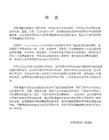
17(08福建) You ____have written so long an article. The teacher said 100 words would be enough.
8.(08重庆)---I can’t find my purse anywhere.
---You _____have lost it while shopping.
A. may B. can C.should D. would
9.(09抚州) ---Did you visit the famous museum?
---No. We_____it,but we spent too much time shopping.
A. could have visited B.must have visited C. can’t have visited D.shouldn’t have visited
29Jean’pale face suggested that she___ill,and her parents suggested that she______a medical examination.
A. be; should have B. was;have C. should be; had D. was; had
23____the English examination I would have gone to the concert last Sunday.
A. In spite of B. But for C. Because of D. As for
【超值精品】高考英语 5年高考3年模拟 专题九 情态动词和虚拟语气(浙江专版)

(超值精品)2013届英语科5年高考3年模拟专题九情态动词和虚拟语气一、情态动词情态动词只有情态意义,即它所表示的是说话人对动作的观点,如需要、可能、意愿或怀疑等。
1. 情态动词没有实义动词的各种变化,只有could, would, had to, m ight等几个过去式。
其它如must, ought to 等的过去式皆与现在式同形。
2.大多数情态动词有多个意义。
如can可表“能够”“可能”“允许”等。
3. 在用法上,情态动词与助动词一样,须后接动词原形,构成谓语动语。
4. 情态动词有can,could, may, might, will, would, shall, should, o ught to, must, need, dare, used to 共十三种形式,不同的情态动词所表示的意义并不是相互排斥的,同一个意义常常可以由几个不同的情态动词以相同或不同的程度表示出来。
另一方面,同一个情态动词在同一个句子中可能表示不同的意义,在没有上下文的情况下,句子可能出现歧义。
如:He can’t come.他不能来。
句中can’t既可能表示说话人不允许,又可能表示主语无能力。
情态动词在表示多种意义的同时,相互之间既有联系,又有区别,前十个情态动词的联系大体围绕着两个方面:一是行为的自由(包括能力、允许和义务),二是推测。
它们之间的区别则体现在行为自由程度(degrees of freedom to act)的大小,和推测把握性的大小。
在这两个方面,最小和最大的都是might和must,如:You might d o it for me, please. 请你为我做这件事。
(近似请求的命令)You must do it for me. 你必须为我做这件事。
(不容违抗的命令)That might be Tom. 那或许是汤姆。
(把握性最小)That must be Tom. 那肯定是汤姆。
(抉择性最大)(1)Can / could的用法1. 1.表能够。
虚拟语气与情态动词的区别及用法解析

虚拟语气与情态动词的区别及用法解析虚拟语气和情态动词是语法中两个不同的概念,但在一些语法规则和用法上有一些相似之处。
虚拟语气是一种用来表示假设、愿望、建议、要求等非现实情况的语气,它并不是真实存在的,而是对虚构的事件或状态进行描述。
而情态动词则是一类用于表示说话人的态度、推测、能力、许可等情态意义的动词。
一、虚拟语气的用法1. 假设虚拟语气经常用于表示虚拟的假设情况,即与事实相反或不可能实现的情况。
常见的虚拟语气形式包括“如果…(过去式)”,“要是…(过去式)”等。
例如:- If I were a bird, I would fly freely in the sky.如果我是一只鸟,我就可以在天空中自由飞翔。
2. 愿望虚拟语气还可以用于表示愿望,即对现实情况的一种虚构或想象。
常见的虚拟语气形式包括“希望…(过去式)”,“但愿…(过去式)”等。
例如:- I wish I had studied harder last night.我希望昨晚学习更努力一些。
3. 建议、要求虚拟语气还可以用于表示建议、要求等情况。
常见的虚拟语气形式包括“(要求、建议)+过去式”。
例如:- The doctor suggested that I take some rest.医生建议我休息一下。
二、情态动词的用法1. 表示能力、推测情态动词可以用来表示说话人的能力或对某种情况的判断。
常见的情态动词有can、could、may、might等。
例如:- She can swim very well.她游泳技术非常好。
2. 表示许可、允许情态动词还可以表示许可或允许的意思。
常见的情态动词有can、may等。
例如:- Can I borrow your pen?我能借用你的笔吗?3. 表示义务、应该情态动词也可以表示说话人对某种行为或义务的责任或要求。
常见的情态动词有should、ought to等。
例如:- You should apologize to him for your mistake.你应该为你的错误向他道歉。
情态动词与虚拟语气

[解析] D 考查虚拟语气。根据主句中的wouldn't可判 断是虚拟语气。if引导的条件状语从句对将来进行虚 拟,从句用were to do或should do或过去式。所以选D。
返回目录
专题8
返回目录
专题8
正反解读情态动词和虚拟语气
• • • •
正 面 解 读
规则2:must表示有把握的推测,意为“一定,肯定”, 用于肯定句中。如: You must be hungry after the long walk. Home cooking must be more delicious. 规则3:have to表示“必须,不得不”,着重强调客观 需 要,能用于更多时态(过去式和将来式)。如: The students today will have to know how to use computers. As he had broken his leg, he had to lie in bed.
正 面 解 读
4.will,would的用法 规则1:用于各种人称,表示意志或决心。will指现在, would则指过去。如: I will do my best to help you. They said that they would help us. 规则2:用于第二人称的疑问句中表示有礼貌的询问和 请求,would 比 will更委婉。如: Would you teach us how to drive a car? Will you please give him a message when you see him?
返回目录
虚拟语气与情态动词

虚拟语气与情态动词虚拟语气表示说话人的愿望、假设、猜测或建议,而不表示客观存在的事实。
虚拟语气通过谓语动词的特殊形式来表示,下面对虚拟语气在各种句式中的用法分别介绍。
虚拟语气用于条件状语从句。
表示与现在事实相反的假设时,条件状语从句中的谓语动词用“过去式(be的过去式用were)”,而主句中的谓语动词用“would(should, could, might)+动词原形。
”例如:If I were you, I should studay English.If he had time, he would attend the meeting.表示与过去的事实相反的假设时,条件状语从句的谓语动词用“had +过去分词”,主句中的谓语动词用“would(should, could, might)+have +过去分词”。
例如:If you had taken my advice, you wouldn’t have failed in the examination.表示与将来事实相反的假设时,条件从句和主句所用的谓语动词怀“表示与现在事实相反的假设”的谓语动词相同,或者条件从句中用“were to(should)+动词原形”。
例如:If you come tomorrow, we would have the meeting.If it were to rain tomorrow, the meeting would be put off.当条件状语从句表示的行为和主句表示的行为所发生的时间不一致时,动词的形式要根据它所表示的时间来调整。
例如:If you had worked hard, you would be very tired.(从句说的是过去,主句指的是现在.)5.以上句型可以转换成下列形式:1)省略if,用“were, have, should +主语”. 例如:Were I in school again, I would work harder.Had you been here earlier, you would have seen him.Should there be a meeting tomorrow, I would come.但在虚拟条件状语从句中,省略连词的倒装形式的句首不能用动词的缩略形式,如我们可以说:Were it not for the expense, I would go to Italy.但不能说Weren’t it for the expense, I would go to Italy.2)用介词短语代替条件状语从句.例如:Without air, there would be on living things.But for your help, I couldn’t have done it.3)用其了方式表示.例如:It would produce had results to do that.= If you have done that, it would produce bad results.(二)虚拟语气用于宾语从句“wish +宾语从句”表示不能实现的愿望,汉语可译为“可惜……”. “……就好了”, “悔不该……”, “但愿……”等.表示现在不能实现的愿望,从句的谓语动词用过去式;表示将来不能实现的愿望用“would(could) +动词原形”;表示过去不能实现的愿望时用“had +过去分词”或“(could)would +have +过去分词”.例如:I wish it were spring all the year round.I wish you could go with us.We wish we had arrived there two hours earlier.虚拟语气在动词arrange, command, demand, desire, insist, order, propose, request, require, suggest,等后面的宾主从句中用“(should)+动词原形”.例如:We suggested that we (should) have a meeting.We insisted that they (should) go with us.The doctor ordered that she (should) stay in bed for a few days.He demanded that we (should) start right away.注意:insist作“力言”, “强调”解时,宾语从句不用虚拟语气,只有当insist作“坚持(认为)”, “坚持(应该)”解时宾语从句才用虚拟语气.例如:Mike insisted that he had never stolen anything.(三)虚拟语气用于表语从句、同位语从句作advice, idea, order, demand, plan, proposal, suggestion, request等名词的表语从句和同位语从句,其谓语动词要用虚拟语气的结构“(should)+动词原形”.例如:We all agreed to his suggestion that we (should) go to Beijing forsightseeing.My idea is that we (should) exercises first.(四)虚拟语气在as if(as though),even if( even though)等引导的表语从句或状语从句中的应用.如果从句表示的动作发生在过去,用过去完成时,指现在状况,则用过去时,指将来则用过去将来时.例如:He looked as if he were an artist.He speaks English so fluently as if he had studied English in England.Even if he were here,he could not solve the problem.(五)虚拟语气用于主语从句.在主语从句中,谓语动词的虚拟语气结构用“should 十动词原形”的结构,表示惊奇、不相信、惋惜、理应如此等.例如:It is necessary( important,natural,strange,etc) that …we should cleanthe room every day.It was a pity ( a shame,no wonder,etc) that you should be so careless.It will be desired( suggested,decided,ordered,requested,proposed,etc)that she should finish her homework this afternoon.在上述三种主语从句中,should意为“应该”,“竟然”,可以省去,但不可换用would.主句所用动词的时态不限.注意:这种从句表示的是事实.如果说话人对这种事实表现出惊奇的情感,就可用虚拟语气.反之,如果不表示惊奇等情感.That从句也可用陈述语气,例如:It is a strange that he did not come yesterday.It is a pity that you can’t swim.(六)虚拟语气用于定语从句这种从句常用在It is( high) time( that)…句型中,定语从句的谓语动词用过去式,或should十动词原形( should不能省略,be用were)来表示,意为“(现在)该……”。
高三年级英语(外研版)总复习语法课件_专项语法突破(9)情态动词与虚拟语气

have done
常用在否定句和疑问 ② Can
he
have
gone
句中。
to his uncle's?
必修5
专项语法突破(九)
高考英语总复习
情态动词 +完成式
用法
例句
可用于肯定句中,表示 外 研
对过去没有实现的事 You could have done 版 could 情的遗憾或责备,意为 better, but you were have done
和 wish 等后的宾语从句的谓语动词形式;
(3)It's time 和 would rather 后从句的谓语动词形式。
必修5
专项语法突破(九)
高考英语总复习
4.解答情态动词和虚拟语气这类题目时,一定要细细
领会情景特征,情景中没有废话,不要放过任何细节。只 外
研
有这样,才会找到足够的有效信息,做出最佳选择。
版
(not)
在否定句中表示“可能 ② He may not have
have done 不”,不用于疑问句中。finished the work.
用 might 则表示语气更 ③ She might have
加不肯定。
caught a cold.
必修5
专项语法突破(九)
高考英语总复习
情态动词 +完成式
外 研
版
情态动词 can 可用于肯定句中表示客观的(理论的)可能性,
也可以表示“一时或暂时的”情况,而表示具体事情实际
发生的可能性时,can 一般不用于肯定句中。如:
必修5
专项语法突破(九)
高考英语总复习
Accidents can happen on such rainy days.
备战2021高考英语热点题型和提分秘籍 专题09 虚拟语气与情态动词(原卷版) Word版缺答案

专题九虚拟语气与情态动词【高频考点解读】1.考查情态动词的基本意义和用法,特殊是can,may,must,need,shall,should,had better,would rather 等。
要求把握情态动词的语法特征和语义特征,区分意义相近、用法类似的情态动词。
2.考查情态动词表示推想、承诺、恳求、推断的用法,尤其是can,could,may,might,must表示推想的用法。
要求精确把握说话者的语气,深刻体会说话者的情感态度,结合情景做出合理选择。
3.考查“情态动词+have done”结构的用法。
要求把握该结构中不同的情态动词所表达的特殊意义。
4.考查虚拟语气在条件句中的用法。
要求把握与现在、过去、将来三个不同时间的事实相反的虚拟语气,以及省略if的虚拟倒装句。
5.考查虚拟语气在隐含的虚拟条件和错综时间条件句中的用法。
要求识别由一些介词或连词供应的虚拟条件,明确主句和条件状语从句谓语所发生的不同时间。
6.考查虚拟语气在名词性从句中的用法,留意在这些固定句型中谓语所使用的形式。
【热点题型】题型一考查can/could与be able to例1、(2021·江西,29)When I was a child,I ________ watch TV whenever I wanted to.A.should B.couldC.must D.need【提分秘籍】1.can/could用来表示“一般力量”;be able to有多种时态,且用来表示在特定条件下的“具体力量”。
如:My grandma is over seventy,but she can still read without glasses.They will be able to tell you the news soon.He was able to flee Europe before the war broke out.2.表示允许可用can或could,与may/might意义接近。
(完整版)含有情态动词的虚拟语气

“would+have+done”虚拟语气,表示对过去事情的假设,意思是“本来会做”1. I would have told you all about the boy's story, but you didn't ask me. 我本来会告诉你这个小男孩的故事,但是你没有问我。
2. Without your help, I wouldn't have achieved so much. 没有你的帮助,我是不会取得如此大的成绩。
“could+have+done”是虚拟语气,表示对过去事情的假设,意思是本来能够做某事而没有做。
He could have passed the exam, but he was too careless. 本来他能够通过考试,但是他太粗心。
请看相关知识点:一、“must+have+done”表示对过去事情的肯定推测,译成“一定做过某事”,该结构只用于肯定句。
1. It must have rained last night, for the ground is wet. 昨晚一定下雨了,因为地面还是湿的。
2. You must have been mad to speak to the servant. 你和仆人说话,一定是发疯了。
二、“can't+have+done”表示对过去事情的否定推测,译成“不可能做过某事”。
1. Mr. Smith can't have gone to Beijing, for I saw him in the library just now. 史密斯先生不可能去北京了,我刚才还在图书馆见过他。
2. Mary can't have stolen your money. She has gone home. 玛丽不可能偷你的钱,她回家去了。
三、“can+have+done”表示对过去行为的怀疑,用于疑问句,译成“可能做过……吗?”。
语法篇专题情态动词和虚拟语气
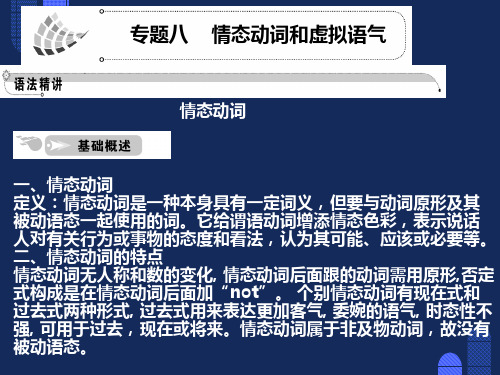
用法
例句
can和could
表示能力
He can speak English better than you.
表示请求 或允诺?
You can have the book when I have finished it. Could you come again tomorrow?
表示客观可能性
should have done
过去本来应该……,而实际上没有……
The plant is dead. Maybe I should have given it more water.
ought to have done
过去本该……,而未……
You ought to have given him more help.
专题八 情态动词和虚拟语气
情态动词
一、情态动词 定义:情态动词是一种本身具有一定词义,但要与动词原形及其被动语态一起使用的词。它给谓语动词增添情态色彩,表示说话人对有关行为或事物的态度和看法,认为其可能、应该或必要等。 二、情态动词的特点 情态动词无人称和数的变化, 情态动词后面跟的动词需用原形,否定式构成是在情态动词后面加“not”。 个别情态动词有现在式和过去式两种形式, 过去式用来表达更加客气, 委婉的语气, 时态性不强, 可用于过去,现在或将来。情态动词属于非及物动词,故没有被动语态。
三、情态动词的语法特征 (1) 情态动词不能表示正在发生或已经发生的事情,只表示期待或估计某事的发生。 (2) 情态动词除ought 和have 外,后面只能接不带to 的不定式。 (3) 情态动词没有人称和数的变化,即其第三人称单数不加s。 (4) 情态动词没有非限定形式,即没有不定式,分词形式,也没有相应的动名词。 四、情态动词的基本用法
8.情态动词与虚拟语气汇总

1. (1) You may go home now.
(2) — May I borrow your towel? — Yes,you may./No, you can't(mustn't). 1. (1)你现在可以回家。 (2) ——我可以借用你的毛巾吗?
—— 是的,你可以。 / 不行,你不可以。 / 不, 你决不能借用我的毛巾。
2. Will you help me with my work?
在我工作方面帮助我好吗?
5
3. Every morning he will have a walk along this river. 每天早上他都会沿着河流散步。 4. If you will read this article,you will realize you are wrong. 假如你愿意看这篇文章,你就会认识到你错了
5
will 的主要用法有: 1.表示意志、意愿;
2.在疑问句中用于第二人称,表示请求或询问 对方的意思;
3.表示习惯、经常性、倾向性,有“惯于、总 是”等意义; 4.在if,when,until等连词引导的表示时间
5
或条件的从句中要用一般时表将来,但在 if 从句中 有时为了表示意愿也可用will,有“愿意”的意思。
中国南方的一些城市冬天里可能会很冷的。
3
can的主要用法有: 1. 表能力,翻译为“能够/会”。
2. 表可能性,翻译为“可能/会”。
3. 表许可,翻译为“可以”,用于否定句,表示 不允许,翻译为“不可以/不能”。 4. 表示偶然发生的可能性,翻译为“有时会”。 5. 用于否定句,表推测,翻译为“不可能”。
祝你成功。
5. (1)You may well say so.
2020年高考英语必考点专题09情态动词和虚拟语气(精讲深剖)(含解析)

专题09 情态动词和虚拟语气——精讲深剖1. ( 2019 江苏卷) What a pity! You missed the sightseeing, or we ______________ a good time together.A. hadB. will haveC. would have hadD. had had【答案】 C【解析】考查虚拟语气。
句意:真遗憾!你错过了这次观光,否则,我们本应该在一起度过一段愉快时光的。
根据上文,可知是对过去事情的虚拟,与过去事实相反的假设。
其句子结构为:从句: If+ 主语 +过去完成时 +其他,主句:主语 +should(would, could, might)+ 现在完成时 +其他,故选 C。
2. ( 2019 天津卷) The workers were not better organized, otherwise they ___________________ the task inhalf the time.A. accomplishedB. had accomplishedC. would accomplishD. would have accomplished【答案】 D 【解析】考查虚拟语气。
句意:工人们没有被更好的组织起来,否则他们用一半的时间就能完成任务。
根据上句 the workers were not better organized 可知,这是对过去事情的虚拟。
与过去事实相反的假设。
其句子结构为:从句: If+ 主语 +过去完成时 +其他,主句:主语 +should(would, could, might)+ 现在完成时 +其他,故选 D。
3.( 2018 天津卷) I can't find my purse. I it in the supermarket yesterday, but I'm notsure.A. should leave B .must have leftC. might leave D. could have left【答案】 D。
专题九 情态动词和虚拟语气
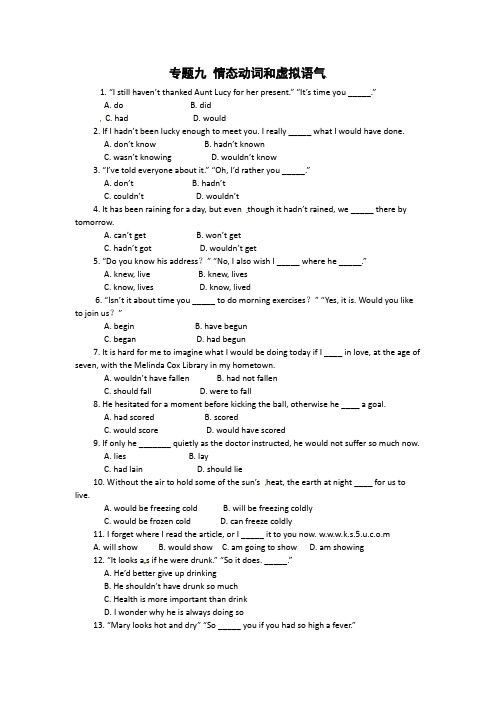
专题九情态动词和虚拟语气1. “I still haven’t thanked Aunt Lucy for her present.” “It’s time you _____.”A. doB. didC. hadD. would2. If I hadn’t been lucky enough to meet you. I really _____ wh at I would have done.A. don’t knowB. hadn’t knownC. wasn’t knowingD. wouldn’t know3. “I’ve told everyone about it.” “Oh, I’d rather you _____.”A. don’tB. hadn’tC. could n’tD. wouldn’t4. It has been raining for a day, but even though it hadn’t rained, we _____ there by tomorrow.A. can’t getB. won’t getC. hadn’t gotD. wouldn’t get5. “Do you kn ow his address?” “No, I also wish I _____ where he _____.”A. knew, liveB. knew, livesC. know, livesD. know, lived6. “Isn’t it about time you _____ to do morning exercises?” “Yes, it is. Would you like to join us?”A. beginB. have begunC. beganD. had begun7. It is hard for me to imagine what I would be doing today if I ____ in love, at the age of seven, with the Melinda Cox Library in my hometown.A. wouldn’t have fallenB. had not fallenC. should fallD. were to fall8. He hesitated for a moment before kicking the ball, otherwise he ____ a goal.A. had scoredB. scoredC. would scoreD. would have scored9. If only he _______ quietly as the doctor instructed, he would not suffer so much now.A. liesB. layC. had lainD. should lie10. With out the air to hold some of the sun’s heat, the earth at night ____ for us to live.A. would be freezing coldB. will be freezing coldlyC. would be frozen coldD. can freeze coldly11. I forget where I read the article, or I _____ it to you now. w.w.w.k.s.5.u.c.o.mA. will showB. would showC. am going to showD. am showing12. “It looks a s if he were drunk.” “So it does. _____.”A. He’d better give up drinkingB. He shouldn’t have drunk so muchC. Health is more important than drinkD. I wonder why he is always doing so13. “Mary looks hot and dry” “So _____ you if you had so high a fever.”A. doB. areC. willD. would14. “He will come tomorrow.” “But I’d rather he _____ the day after tomorrow.”A. will comeB. is comingC. cameD. had come15. All the doctors in the hospital insisted that he ____ badly wounded and that he ____ at once.A. should be; be operated onB. were; must be operated onC. was; should be operatedD. was; be operated on16. ______ smoking, he would not have got cancer in the lung.A. Was he given upB. Had he given up w.w.w.k.s.5.u.c.o.mC. Did he giveD. If he gave up17. “I still haven’t thanked Aunt Lucy for her present.” “It’s time you _____.”A. doB. didC. hadD. would18. “Do you know his address?” “No, I also wish I _____ where he _____.”A. knew, liveB. knew, lives w.w.w.k.s.5.u.c.o.mC. know, livesD. know, lived19. It is hard for me to imagine what I would be doing today if I ____ in love, at the age of seven, with the Melinda Cox Library in my hometown. w.w.w.k.s.5.u.c.o.mA. wouldn’t have fallenB. had not fallenC. should fallD. were to fall20. Without the air to hold some of the sun’s heat, the earth at night ____ for us to live.A. would be freezing coldB. will be freezing coldlyC. would be frozen coldD. can freeze coldly21.________ fired, your health care and other benefits will not be immediately cut off.A. Would you beB. Should you beC. Could you beD. Might you be22.You can’t imagine that a well-behaved gentleman _____ be so rude to a lady.A. mightB. needC. shouldD. would23.—Excuse me. But I want to use your computer to type a report.—You _____have my computer if you don’t take care of it .A. shan’tB. might notC. needn’tD. shouldn’t24. He _____ have completed his work; otherwise, he wouldn’t be enjoying himself by the seaside.A. shouldB. mustC. wouldn’tD. can’t25. I ______ have been more than six years old when the accident happened.A. shouldn’tB. couldn’tC. mustn’tD. needn’t26. There _____ be any difficulty about passing the road test since you have practiced a lot in the driving school.A. mustn’tB. shan’tC. shouldn’tD. needn’t27. I was on the highway when this car went past fol. Lowed by a police car. They______ at least 150 kilometers an hour.A. should have been doingB. must have been doingC. could have doneD. would have done28. —I’ve taken someone else’s green sweater by mistake.—It ______ Harry’s. He always wears green.A. has to beB. will beC. mustn’t beD. could be29. — Catherine, I have cleaned the room for you.— Thanks. You ______ it. I could manage it myself.A. needn’t doB. needn’t have doneC. mustn’t doD. shouldn’t have done30. —Lucy doesn’t mind lending you her dictionary.—She _______. I’ve already borrowed one.A. can’tB. mustn’tC. needn’tD. shouldn’t反思:与现在相反用过去式,与过去相反用完成式!。
二轮复习 (九)情态动词和虚拟语气
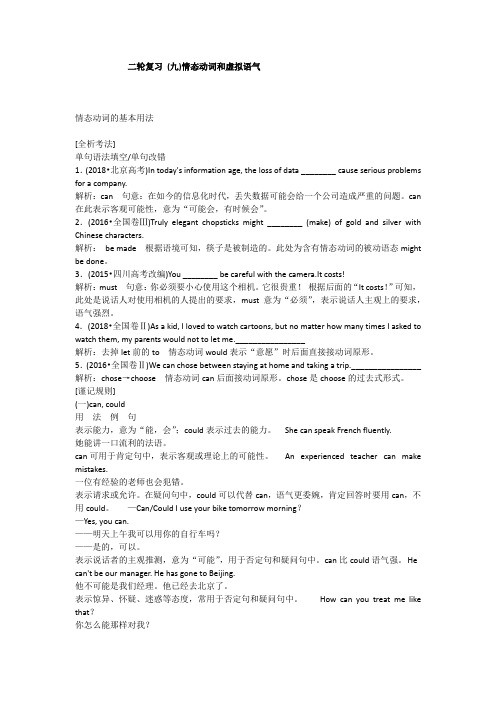
二轮复习(九)情态动词和虚拟语气情态动词的基本用法[全析考法]单句语法填空/单句改错1.(2018•北京高考)In today's information age, the loss of data ________ cause serious problems for a company.解析:can句意:在如今的信息化时代,丢失数据可能会给一个公司造成严重的问题。
can 在此表示客观可能性,意为“可能会,有时候会”。
2.(2016•全国卷Ⅲ)Truly elegant chopsticks might ________ (make) of gold and silver with Chinese characters.解析:be made根据语境可知,筷子是被制造的。
此处为含有情态动词的被动语态might be done。
3.(2015•四川高考改编)You ________ be careful with the camera.It costs!解析:must句意:你必须要小心使用这个相机。
它很贵重!根据后面的“It costs!”可知,此处是说话人对使用相机的人提出的要求,must意为“必须”,表示说话人主观上的要求,语气强烈。
4.(2018•全国卷Ⅱ)As a kid, I loved to watch cartoons, but no matter how many times I asked to watch them, my parents would not to let me.________________解析:去掉let前的to情态动词would表示“意愿”时后面直接接动词原形。
5.(2016•全国卷Ⅱ)We can chose between staying at home and taking a trip.________________解析:chose→choose情态动词can后面接动词原形。
第九节情态动词和虚拟语气讲义-高三英语一轮复习

第九节情态动词和虚拟语气〔真题演练〕1. (经典高考)I can’t find my purse. I could (leave)it in the supermarket yesterday, but I’m not sure.2. (经典高考)Truly elegant chopsticks might (make)of gold and silver with Chinese characters.3. (经典高考)What a pity! You missed the sightseeing, or we(have) a good time together.4. (经典高考)If we (catch)the flight yesterday, we would be enjoying our holiday on the beach now.〔必备知识〕考点一情态动词1.情态动词的基本用法情态动词用法例句can/could表示“能力”,意为“能,会”Samuel, the tallest boy in our class,can easily reach the books on the top shelf. Samuel是我们班最高的男孩,他能轻易地拿到书架顶层的书。
表示推测,意为“可能”,往往用于否定句或疑问句中。
can比could语气强That can’t be Mary—she is in London now.那不可能是玛丽——她现在在伦敦。
表示客观可能性,意为“有时候会”,多用于肯定句Credit cards provide us with lots of convenience, but sometimes they can lead to problems.信用卡给我们提供了许多方便,但有时候会带来一些问题。
表示礼貌地请求,意为“能,可以”。
在疑问句中could可代替can, 语气更委婉Can you tell us your recipe for happiness and a long life?你能告诉我们你幸福和长寿的秘诀吗?固定句式:can’t...too/enough“无论多么……也不过分”“越……越好”I can’t thank you too much for all your help to my son while we were away from home.我非常感谢你在我们不在家时对我儿子的帮助。
高中英语真题-第九讲 情态动词和虚拟语气

高中英语真题:第九讲情态动词和虚拟语气一、情态动词考点透析1.can (could),be able to。
can只有现在式can和过去式could两种形式, be able to可用于现在式、过去式、将来时、完成时。
要表示“能够做某事”,可用can或be able to,但若要说过去的确运用了某种能力做成了某件事情,就只能用was/were able to,表将来具备的能力只能用will/shall be able to。
(1)If you study hard,you will be able to express freely in English in three months. (2)The fire spread through the hotel very quickly but everyone was able to get out.2.could是can的过去式,但是在很多情况下,特别是在口语中,它表示语气的委婉。
因此,用could提问时,不能用could 回答,而要用can或may。
would,might用于疑问句时也表委婉语气,回答时应该用will,may。
(1)-Could I borrow your dictionary?-Yes,of course you can.(2)-Could I call you by the first name?-Yes,you may.(3)-Would you be so kind as to explain the word?-Yes,I will.What is it?3.may/might,can/could都可表示可能,但may/might 不能用于问句,can/could用于否定句、疑问句、感叹句,表示惊异、怀疑,一般不用于肯定句。
如果用于肯定句,则表示偶尔发生某事的可能,或某人某物一时的特点。
(1)-Are you coming to Jeff's party?-I'm not sure.I might go to the concert instead.(2)-Where can Mr.Li be?-Sorry,I don't know.You can go to ask Mr.Zhang.He may help you.(3)Mr.Bush is on time for everything.How can it be that he was l ate for the opening ceremony?(4)We enjoy good weather in January,but sometimes it can be terribly cold.4.must表推测用于肯定句,其否定式要用can't。
语法专题九 情态动词和虚拟语气
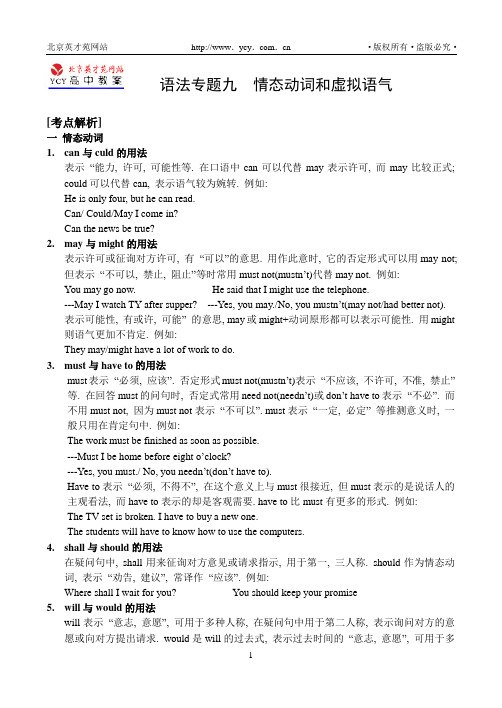
语法专题九情态动词和虚拟语气[考点解析]一情态动词1.can与culd的用法表示“能力, 许可, 可能性等. 在口语中can可以代替may表示许可, 而may比较正式;could可以代替can, 表示语气较为婉转. 例如:He is only four, but he can read.Can/ Could/May I come in?Can the news be true?2.may与might的用法表示许可或征询对方许可, 有“可以”的意思. 用作此意时, 它的否定形式可以用may not;但表示“不可以, 禁止, 阻止”等时常用must not(mustn’t)代替may not. 例如:You may go now. He said that I might use the telephone.---May I watch TY after supper? ---Yes, you may./No, you mustn’t(may not/had better not).表示可能性, 有或许, 可能”的意思, may或might+动词原形都可以表示可能性. 用might 则语气更加不肯定. 例如:They may/might have a lot of work to do.3.must与have to的用法must表示“必须, 应该”. 否定形式must not(mustn’t)表示“不应该, 不许可, 不准, 禁止”等. 在回答must的问句时, 否定式常用need not(needn’t)或don’t have to表示“不必”. 而不用must not, 因为must not表示“不可以”. must表示“一定, 必定”等推测意义时, 一般只用在肯定句中. 例如:The work must be finished as soon as possible.---Must I be home before eight o’clock?---Yes, you must./ No, you needn’t(don’t have to).Have to表示“必须, 不得不”, 在这个意义上与must很接近, 但must表示的是说话人的主观看法, 而have to表示的却是客观需要. have to比must有更多的形式. 例如:The TV set is broken. I have to buy a new one.The students will have to know how to use the computers.4.shall与should的用法在疑问句中, shall用来征询对方意见或请求指示, 用于第一, 三人称. should作为情态动词, 表示“劝告, 建议”, 常译作“应该”. 例如:Where shall I wait for you? You should keep your promise5.will与would的用法will表示“意志, 意愿”, 可用于多种人称, 在疑问句中用于第二人称, 表示询问对方的意愿或向对方提出请求. would是will的过去式, 表示过去时间的“意志, 意愿”, 可用于多种人称. 若表示说话人的意愿或向对方提出请求, 语气比will婉转, 指现在时间. 例如:I will tell you all about it. He won’t go with us.Would you like some coffee?6.need的用法用作情态动词时, need表示“敢; 敢于”, 主要用于疑问句, 否定句和条件从句中, 一般不用于肯定句. 例如:You needn’t come so early7.dare的用法dare用作情态动词时, 和need一样, 也是主要用于疑问句, 否定句和条件从句中. 例如: He daren’t speak English before such a crowd, dare he?8.ought to的用法ought to表示“应该” (与should同义, 只是语气稍重一些), 也可表示推测. 例如:You ought to take care of him. He ought to be home by now.ed to的用法表示过去的习惯动作或状态(现在已不复如此).例如:---Did you use to go there to see your brother? /Used you to go there to see your brother?---Yes, I did(used to). /No , I didn’t (usedn’t)10.had better的用法表示“最好(做……)”. 例如:We had better go now. Breakfast had better be eaten before 8 o’clock.情态动词用法归纳:二虚拟语气虚拟语气在虚拟条件中的运用(1)表示与现在事实完全相反的假设用以表示与现在事实相反的假设或现在实现可能性不大的情况. 条件从句用动词过去式(be 多用were), 主句用would/should/could/might+动词原形. 例如:If I were a bird, I could fly.如果我是一只鸟儿的话, 我就能飞了.(2)表示与过去事实完全相反的假设条件从句用had+过去分词, 主句用would/should/could/might+ have+过去分词. 例如:It we had started earlier, we should not have missed the train.如果我们早点出发, 就不会错过这列火车了.(3)表示与将来情形相反的假设或极少有可能实现的情况条件从句用动词过去式, should+动词原形, were to+动词原形, 主句动词用would/should/could/might+动词原形. 例如:If Professor Li should have time tomorrow, we could ask him questions.如果李教授明天有时间的话, 我们就可以问他问题了.书面语中, 上述三种时态的虚拟句中, 如果从句里含有should, had, were或其他助动词, 则可将从属连词if省去, 将助动词或情态动词放在句首形成部分倒装. 例如:Were he in your position, he’d have done the same.如果他在你的位置上, 他也会那么做的.2.错综时间虚拟句通常情况下, 在非真实条件句中主句和从句的谓语动词所指时间是一致的, 但有时也可能指不同的时间, 这时要根据上下文的意思采用不同的谓语动词形式, 例如;(1)If I were you, I would have taken his advice. (从句指现在, 主句指过去)如果我是你的话, 我就接纳他的建议.(2)If I had taken my raincoat with me this morning, I would not be wet now. (从句指过去, 主句指现在)如果今天早上带上雨衣的话, 我现在就不会淋湿了.3.含蓄条件句有时假设的情况并不以条件从句表示, 而是暗含在上下文中, 比如通过介词短语来表示. (1)But for your advice, I could not have done it so successfully.要是没有你的建议, 我就不会成功(2)The changes could not have taken place without the open-door policy.要是没有开放政策, 就没有这些变化.(3)I was so busy then, otherwise, I would have gone to help him.那时我太忙了, 否则我就去帮他了.4.虚拟语气在某些从句中的应用(1)在wish, suggest, order, demand, propose, command, request, require, insist, desire, urge动词的宾语从句以及would rather后, 要用“(should)+动词原形”来表示愿望, 建议, 命令, 要求等; 由上述动词派生或转化的名词的同位语从句或表语从句中也要用相应的虚拟形式.像suggestion, proposal, plan, motion, recommendation, demand, order, desire, request, requirement, insistence, advice, decision等词.(2)在It is/was+某些形容词+that从句的句型中, that从句中的谓语动词常用虚拟语气, 即“should+动词原形”表示惊奇, 遗憾, 怀疑, 不满等。
【高考英语】情态动词和虚拟语气(讲解)

语法专项情态动词一.情态动词的含义:情态动词只有情态意义,即表示说话人对动作的观点,如需要,可能,意愿或怀疑等。
情态动词主要有:can(could), may(might), must, shall(should), will(would), need, dare(dared), have to(had to),ought to, had better,would rather, used to等。
二.情态动词的特征:1.在形式上,情态动词没有实义动词的各种变化,只有could, would, had to, might, should等几个过去式。
其他如must, ought to等的过去式皆与现在式同形,且在各种人称后都用同样的形式。
2.在意义上,大多数情态动词有多个意义。
如can可表示“能够”,“可能”,“允许”等。
3.在用法上。
情态动词(除ought后接不定式外)与助动词一样,后接动词原形构成谓语动词。
三.情态动词的用法:(一)can/could的用法:1.表示能力:①表示现在的能力用can;表示过去的一般能力用could,若表示过去经过努力而做成某事,则用was/were able to do sth. 或managed to do sth. 或succeeded in doing sth.---Everyone here can speak English. (现在的能力)---A fire broke out in the hotel last night, but everyone was able to escape. (经过努力做成某事)②表示将来的能力常不用can,而用will be able to的将来时态:---I’ll be able to speak French in another few months.2.表示请求许可:若表示请求别人允许自己做某事,can/could均可,could表示委婉语气。
虚拟语气与情态动词
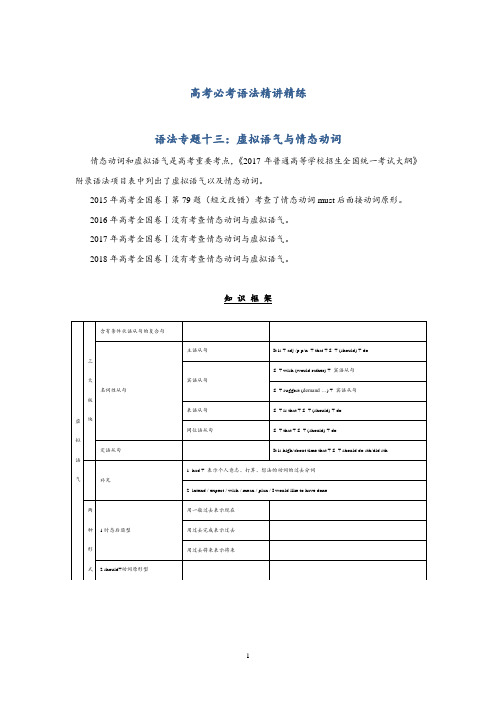
高考必考语法精讲精练语法专题十三:虚拟语气与情态动词情态动词和虚拟语气是高考重要考点,《2017年普通高等学校招生全国统一考试大纲》附录语法项目表中列出了虚拟语气以及情态动词。
2015年高考全国卷Ⅰ第79题(短文改错)考查了情态动词must后面接动词原形。
2016年高考全国卷Ⅰ没有考查情态动词与虚拟语气。
2017年高考全国卷Ⅰ没有考查情态动词与虚拟语气。
2018年高考全国卷Ⅰ没有考查情态动词与虚拟语气。
知识框架一、语气语气是动词的一种形式,表示说话人对某一行为或事情的看法和态度。
二、含有条件状语从句的复合句(以do为例;S.=主语)例如:与过去事实不一致①If I had taken your advice, I would have made great progress.②If it had not been for your help, I wouldn’t have finished the work so easily.与现在事实不一致③If I were you, I would apply for the job.④If I had the money, I would buy it.⑤If I were given another chance, I would do it better.与将来事实不一致⑥If it should rain tomorrow, I would stay at home all day.⑦If you were to come tomorrow, I could wait for you at home.【注意】1.If it had not been for..., ..../If it were not for..., ....要不是...,要是没有...If it hadn’t been for the doctor’s care, I wouldn’t have recovered so soon.Had it not been for the doctor’s care, I wouldn’t have recovered so soon.If it were not for your help, I would still be homeless.Were it not for your help, I would still be homeless.2.在书面语中,条件从句可以不用连词if,而将谓语中的were,had或should 等移至主语之前构成倒装句。
备战2021年高考英语纠错笔记系列专题09情态动词和虚拟语气(含解析)

备战2021年高考英语纠错笔记系列专题09情态动词和虚拟语气(含解析)易错点1 情态动词的误用1. Some people who don’t like to talk much are not necessarily shy; they _______________ just be quiet people.A. mustB. mayC. shouldD. would【错因分析】考生容易误选C项,认为是"一定是",实际上那个地点表示可能性。
【参考答案】Bmay/might接动词原形时表示对现在情形的估量,意思是"可能"。
She thought it might be wise to try her luck here. 她认为在这儿碰碰运气也许不错。
2. —What does the sign over there read?—No person ______________ smoke or carry a lighted cigarette, cigar or pipe in this area.A. willB. mayC. shallD. must【错因分析】考生容易误选A项,认为那个地点要用will表示今后或意愿。
shall在本句中用于第三人称,表示警告和禁止;will表示现在的意志、愿望等,意为"要,期望";may表示许可,或用于要求许可,意为"可,能够";must意为"必须,要,应当"。
【试题解析】句意:——那边的那个标志说的什么?——任何人都不准在那个区域吸烟、或携带点着的香烟、雪茄或烟斗。
依照语境可知那个地点表示警告和禁止,因此要用should。
【参考答案】Cshall用作情态动词要紧有以下两个用法:(1)用于第一、三人称的疑问句,表示征求对方意见。
Shall I help you? 要不要我帮你?Shall I open the window? 要我把窗子打开吗?Shall she go to the concert with us this evening? 她要和我们一起去音乐会吗?(2)用于陈述句中表示允诺、警告、警告、威逼、命令、规定、必定性等(可用于各类人称)。
- 1、下载文档前请自行甄别文档内容的完整性,平台不提供额外的编辑、内容补充、找答案等附加服务。
- 2、"仅部分预览"的文档,不可在线预览部分如存在完整性等问题,可反馈申请退款(可完整预览的文档不适用该条件!)。
- 3、如文档侵犯您的权益,请联系客服反馈,我们会尽快为您处理(人工客服工作时间:9:00-18:30)。
情态动词与虚拟语气(九)
题一
I didn't hear the phone. I _________ asleep.
A. must be
B. must have been
C. should have been
D. could have been 题二—We didn't see him at the lecture yesterday.
—He _________ it.
A. mustn't attend
B. can't have attended
C. would have not attended
D. needed have attended 题三
We ________ a better day to the Great Wall—it was a perfect day yesterday.
A. shouldn't have found
B. needn't have found
C. wouldn't have found
D. couldn't have found 题四—I don’t really like James. Why did you invite him?
—Don’t worry. He come. He said he wasn’t certain what his plans were.
A. must not
B. need not
C. would not
D. might not
题五I went to the doctor's yesterday, I had to wait for half an hour before he ________ see me.
A. can
B. may
C. might
D. could
题六-How's your new babysitter?
-We ____ask for a better one. All our kids love her so much.
A. should
B. might
C. mustn't
D. couldn't
题七It was only eight o'clock. My father _______ be sleeping at that moment.
A. may
B. couldn't
C. should
D. needn't
题八He ________ change his mind, no matter what I said to him.
A. shouldn't
B. couldn't
C. wouldn't
D. mightn't
题九—If he_____ , he ______ that food.
—Luckily he was sent to the hospital immediately.
A. was warned; would not take
B. had been warned; would not have taken
C. would be warned; had not taken
D. would have been warned; had not taken
题十If you ________ that film late last night, you wouldn't be so sleepy.
A. didn't see
B. haven't seen
C. wouldn’t have seen
D. hadn’t seen
题十一If he my advice, he wouldn't have lost his job.
A.followed
B. should follow
C. had followed
题十二Without your help, we________ so much.
A. won ' t achieve
B. didn ‘t achieve
C. don't achieve
D. wouldn't have achieved 题十三
My sister advised me that I ________ accept the invitation.
A. could
B. must
C. should
D. might
课后练习详解
题一
答案:B
解析:本句意为:我没有听见电话,我一定睡着了。
must have done是对于过去的肯定推测。
题二
答案:B
解析:本句意为:—我们在昨天的会议上没有看到他。
—他一定没有出席。
can’t have done 是对于过去的否定推测。
题三
答案:D
解析:本句意为:我们不可能找到去长城的更好的一天了—昨天的天气很棒。
could用于否定句,如果和比较级连用,这时候表示一种肯定概念。
题四
答案:D
解析:本句意为:—我真的不喜欢James。
你为什么邀请他?—别担心,他可能不来,他说他不确定他的计划。
might此处表示一种不确定的可能性。
题五
答案:D
解析:本句意为:我昨天去看医生了,在他能够为我看病之前我不得不等半个小时。
could此处表示能力,即能够的意思。
题六
答案:D
解析:本句意为:-你的新保姆怎么样?--我们找不到更好的了,我的孩子们都如此喜欢她。
could用于否定句,如果和比较级连用,这时候表示一种肯定概念。
题七
答案:B
解析:本句意为:时间仅仅八点钟,我的爸爸当时不会睡觉的。
在英语中否定推测要用can’t 或者couldn’t。
题八
答案:C
解析:本句意为:不管我说什么,他就是不愿意改变主意。
此处wouldn’t表示就是不愿意,表示一种意志意愿。
题九
答案:B
解析:本句意为:—如果他被警告,他就不会吃那种食物的。
—幸运的是他被人立即送进医院。
从句义可以看出,这是对于过去的虚拟,从句中要用过去完成时,主句中要用would/ could/might/should加have done的结构。
题十
答案:D
解析:本句意为:如果你昨天晚上没有看电影很晚,你现在就不会如此的困倦。
从句的时间状语是过去,所以是对于过去的虚拟,对于过去的虚拟从句中要用过去完成时。
题十一
答案:C
解析:本句意为:如果他采纳我的建议,他就不会失去工作。
此处根据意思可知是对于过去的虚拟,从句中要用过去完成时,即谓语动词用had done的结构。
题十二
答案:D
解析:本句意为:没有你的帮助,我们就不会取得这么大的成就。
根据意思可知是对于过去的虚拟,主句中要用would/could/should/might加have done的结构。
题十三
答案:C
解析:本句意为:我的姐姐建议我接受这个邀请。
此处表示建议的内容,从句中要用should 加动词原形,其中should可以省略的虚拟语气。
